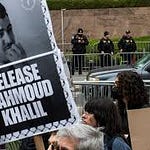When I got the opportunity to teach at Columbia’s School of International and Public Affairs (SIPA) in the fall of 2023 for the spring 2024 semester, I was elated. My dream of teaching in a global environment had come true.
I wanted to use that opportunity to build a course I never had when I was an international affairs student studying human rights and media at SIPA—one that examined how constructs of race and identity are formed, and how mass media has historically shaped our understanding of race and the global order. I knew that race and identity were rarely taught in international affairs schools—or many journalism schools, for that matter. And I rarely had the opportunity to learn from a professor who looked like me.
The class became one of the most popular at SIPA last year. I enjoyed every minute of teaching, even while knowing that across the country, academic offerings on race, identity, and history were under siege. My students came from around the world and across industries, and I learned just as much from them as they did from me and each other. Some even went on to publish their class assignments in local and national media.
A few months later, the course was canceled, and the department it was housed was dissolved. Despite the grief and lack of clarity, I’ve kept quiet….. until now.
Since then, it has been heart-wrenching to watch Columbia’s administration pre-emptively cave to pressure, especially in placing Middle Eastern, South Asian and African Studies under special provost supervision or receivership. It’s been terrifying to see institution after institution across the country cave on diversity, freedom of speech, and academic integrity, not to protect students and faculty, but to protect donors and reputations.
I’ve been thinking of what to do to help others in this moment. So for starters, I’ve decided to liberate my teaching work.
This summer, I will be offering a version of my Columbia course on Race, Media, and International Affairs as an independent, public offering, for this moment.
This is not the time for media literacy or historical knowledge to be held hostage by institutions bending the knee to authoritarianism and fear.
As I said on BlueSky, I don’t know what the future of academia in America will look like after all this. I am both grateful to Columbia for how it shaped me, while also grieving what feels like the loss of the institutional home I knew and loved.
But I do know that in a moment of profound crisis, we cannot wait for elite permission or institutional approval to share knowledge and create learning communities.
I put out a simple post. Over 3,000 people liked it. More than 100 said they would support the course financially. Many said they’d be willing to pay more to offset the cost for someone else. The response was overwhelming.
So… welcome to my Summer School.
Race, Media & International Affairs 101: Summer 2025
Here’s what I can share for now:
The pilot course will run over 4 to 6 weeks, beginning in late June or early July.
I’ll offer a hybrid mix of live online lectures and recordings, access to a syllabus, guest speakers, and live Q+A’s discussion available to paid participants.
To keep things manageable and meaningful, I’ll be capping the weekly discussion cohorts at 20–30 people in addition to the larger lectures, all to allow for real discussion, intimacy, and community.
This course is suitable for all ages. While I taught this at the graduate level, the material is primarily a history and current events course, shedding light on what is not commonly taught in schools. I designed my lectures to be as easy to understand as possible!
We’ll cover a global range of material—from the development of colonial mass media in the U.S., to media coverage of racial justice at the 1919 League of Nations, to how French media portrayed the recent uprisings in France. And much more.
I’ll be curating a thoughtful and diverse global cohort, and I’m asking for a real commitment from participants to show up for the full course.
I’ve priced this at a sliding scale to be accessible and sustainable as possible, so while maintaining the integrity of my original Columbia course.
There is also the option to donate to mutual aid efforts, including possible legal defense or direct support for students and academics whose work is under threat. This course is also an experiment in redistributing knowledge and capital.
Based on interest, the lectures will be on Monday and Wednesday evenings, 6 pm to 7:15 pm Eastern time. This gives students at least two weekly opportunities to engage with the week’s topic.
UPDATE: 4/28 RESISTANCE SUMMER SCHOOL HAS OFFICIALLY SOLD OUT!!
We hit the 500-student cap in 48 hours. Grateful for everyone’s support!
No additional seats will be opened for Race, Media and International Affairs 101— in order to honor the students who committed early.
If you missed your chance to enroll, you can join the official waitlist here:
If you would still like to support this work, donations are of course, always welcome.
Your contributions help fund scholarships and support the ongoing operations of Resistance Summer School.
Everyone on the waitlist will be the first to hear about future offerings before they are announced publicly.
Thank you for believing in this vision — and for being part of something powerful from the beginning.
This is only the start.
We Move!!!!
—Karen
Got More Questions? Here’s an FAQ!
They can try to cancel us all they want. But this is the community we are going to build anyway.
In solidarity and power,
Karen









Share this post